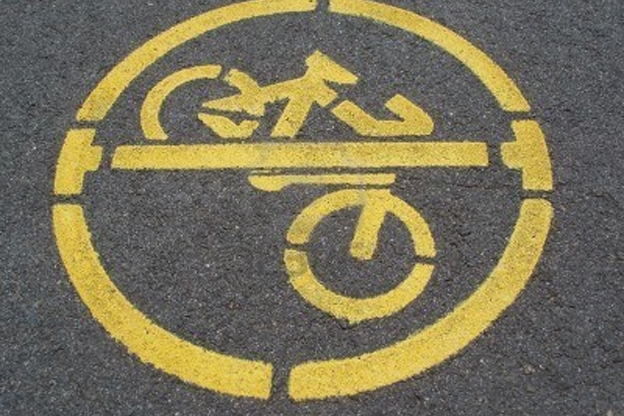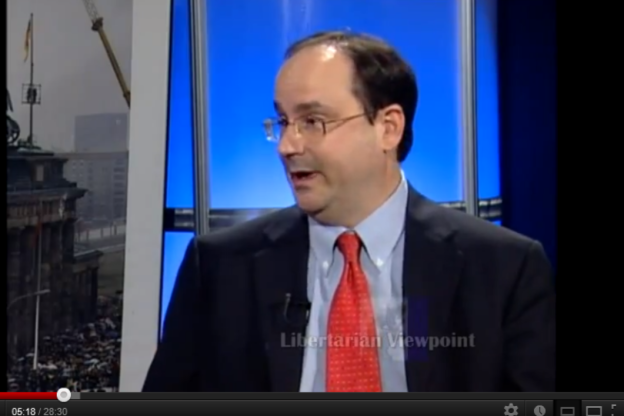

Bill Glahn won’t share the road – reprise
Below is a story that originally ran here on August 17, 2012. It is about then-candidate Bill Glahn’s view of bicycles. You can also read a follow-up story that was published on August 20, 2012. The reason this deserves a repeat now is a blog post by Paul Krugman this morning called Everyday Externalities.
Krugman’s lede:
Via Mark Thoma, a new paper in Vox on the effects of increased rail service, making clever use of natural experiments created by changes in German ownership and regulation. The results aren’t that surprising — more frequent rail service sharply reduces pollution and other costs associated with driving — but it’s good to have this kind of solid work to back our intuition.
Krugman continues:
But we know, as surely as we know anything in economics, that there are huge market failures here — that every time an individual chooses to drive during rush hour, he or she is imposing huge costs on other drivers, people who breathe the air, and more.
These are know as externalities. But conservatives don’t believe in externalities, because they involve other people.
Sen. Rob Portman can have an epiphany on gay marriage when he discovers he has a gay son. Perhaps if the exhaust of his Boulevard Floater was piped back in to the passenger compartment, it would be easier for Uncle Billy to make the connection, too.
– o O o –

One of the really charming things about GOP candidate for the House seat in 49A (Edina) Bill Glahn is his attitude toward anybody who gets around in anything less than a Buick Park Avenue:
Get out of my way!
As reported here earlier, Glahn gated his personal blog in an obvious effort to shield his rantings from the public eye. Which is understandable. Given.
He’s written many times about his animus toward bicycles. Oh, and he hates pedestrians, too. Bill has trouble saying “complete streets” without getting spittle on his obligatory Republican red tie.
Here’s one especially memorable post from his blog from September of last year:
The Secretary of Transportation, Ray LaHood, has famously declared “the end of favoring motorized transportation” in federal policy. Don’t I know it.
Today (Friday) I foolishly attempted to make a quick run to the bank at 4 p.m. I needed to be back by 5 p.m. The trip is less than 12 miles and my computer indicates it should take 15 minutes. Round trip, plus 10 minutes for my transaction, should still leave 20 minutes to spare for my 5 p.m. appointment.At 4:30 p.m., I abandoned the attempt, having gotten only 8 miles downrange and scrambled to get back home by 5. On the outbound leg, I averaged well under 20 miles per hour, travelling exclusively on “freeways.” The radio reports on the metro-area traffic made no mention of any accidents or other notable impediments on my route. The weather was partly cloudy and 60 degrees. The idea that a 23-mile round trip is not possible in the 4 o’clock hour bodes ill for our future. Sixteen miles per hour, even in rush hour, is not acceptable in a modern economy.
Seconds Count
In today’s Wall Street Journal, an article on UPS caught my eye. The delivery company is getting rid of keys for its iconic brown vans, replacing the keys with electronic fobs. This “keyless” system is expected to save $70 million a year, by saving 1.75 seconds with drivers pushing a button instead of turning a metal key in a lock. Those seconds adds up to 6.5 minutes a day, per driver.
I’m not UPS. I could abandon my trip and save the errand for Monday. UPS can’t. The parcels have to be delivered. And those 6.5 minutes will be swallowed up if it takes an hour and a half to go 23 miles. In our modern economy, seconds count, but our transportation policy assumes otherwise.
Instead, the feds follow fashionable policies to promote bikes and trains–nineteenth century technologies–as 21st century transportation solutions. Instead, we should focus on removing transportation bottlenecks and reducing overall travel times for the dominant forms of transportation. Bicycles and intra-city rail are niche applications, not capable of moving significant numbers of people or cargo, at the speeds we need, to have a competitive economy.
Favoring motorized transportation has produced the world’s strongest economy, why stop now?
Why indeed, Uncle Billy?
So kids, as Uncle Billy sees it, it is unacceptable, at four PM on a Friday afternoon, that he should slide behind the wheel of the Boulevard Floater, fire up the Belchfire 8, nose the Floater onto the freeway, and encounter another car. It is clearly all the bicycle’s fault.
The Internet even told him there would be no problem, and as we all know, the Internet is never wrong. (But based on where Glahn lives, he’s almost certainly talking about Highway 100 or the Crosstown, and everyone knows at four o’clock on a Friday afternoon these two freeways are clogged. Glahn cannot be serious that he didn’t think he’d have a problem.)
But Uncle Billy, where’s your libertarian spirit? You should have left hours earlier on foot, not relying on the dagnab gubmint to deliver you in air conditioned comfort to your bank! You’re getting soft, Uncle Billy.
In addition to writing about it, Bill Glahn also pontificated about “complete streets” on Libertarian teevee and on the Late Debate. Here’s a video of an appearance with Sue “We Love Smokers” Jeffers. The video is, frankly, a snore, but the introduction is kind of funny.
It deserves mention, just in passing, of course, that Bill Glahn is a “private citizen” because he lost his rice bowl when TPaw left office.
Uncle Billy has an office in downtown Minneapolis. Every rail or bus rider, and every bicyclist who hauls his or her frozen backside downtown on a bicycle is one fewer car on the road, and one fewer competitor for a parking spot for Uncle Billy’s Boulevard Floater.
Uncle Billy, ought, in fact, to stand on the Greenway once in a while and thank passing bicyclists for making his life easier.
Thanks for your feedback. If we like what you have to say, it may appear in a future post of reader reactions.

